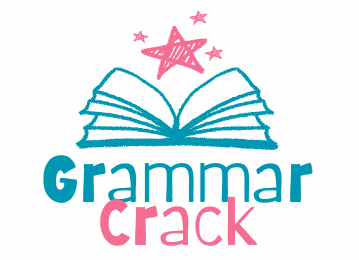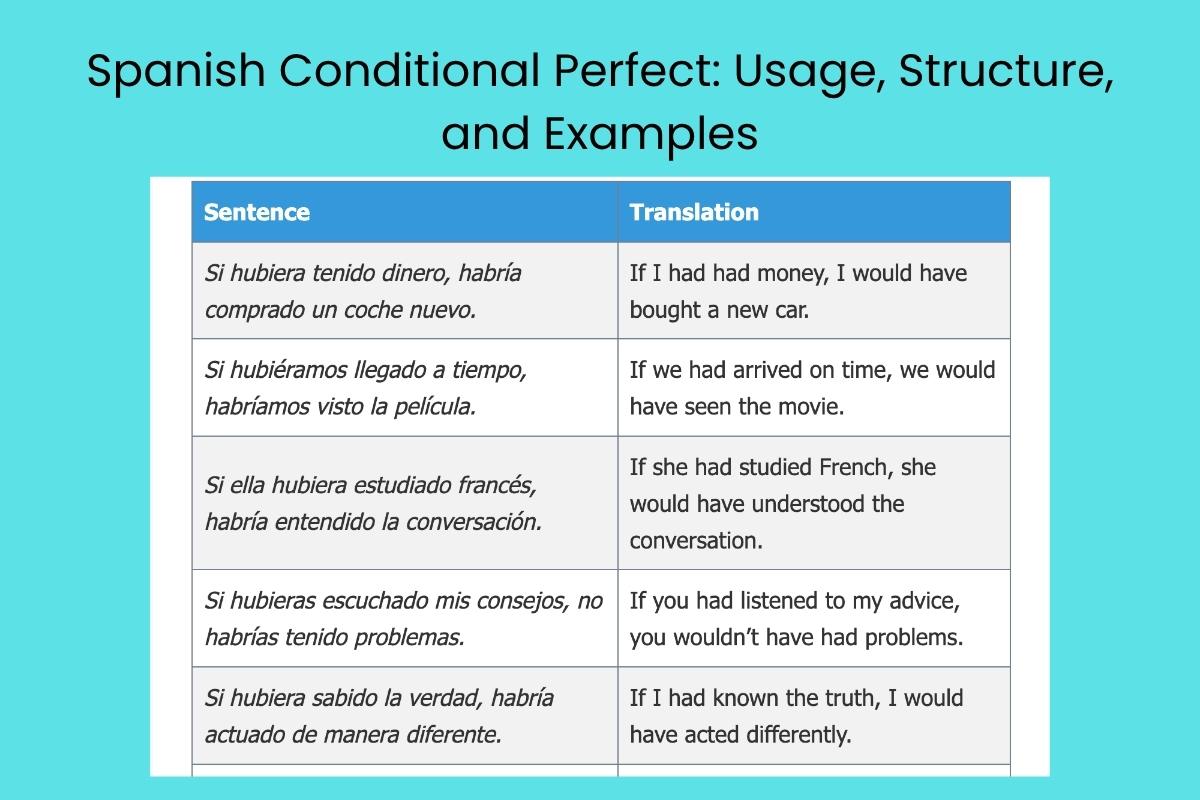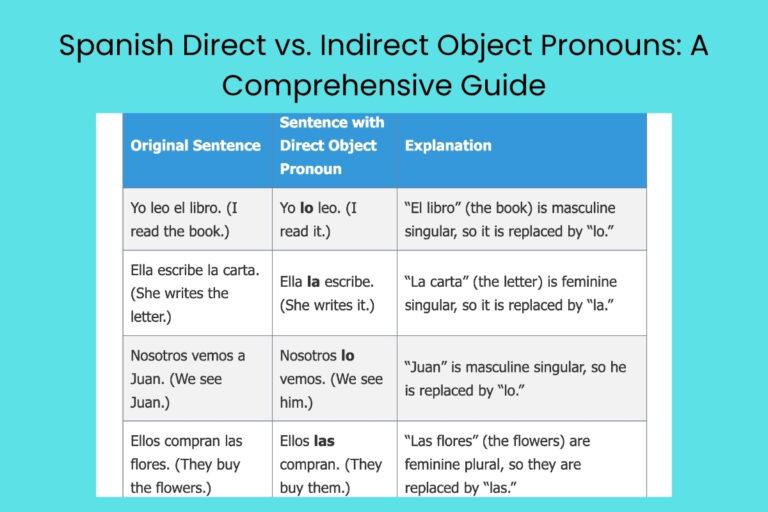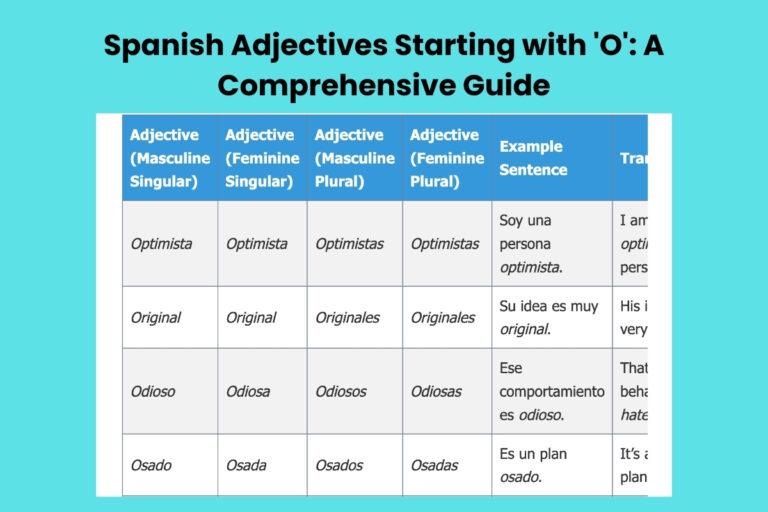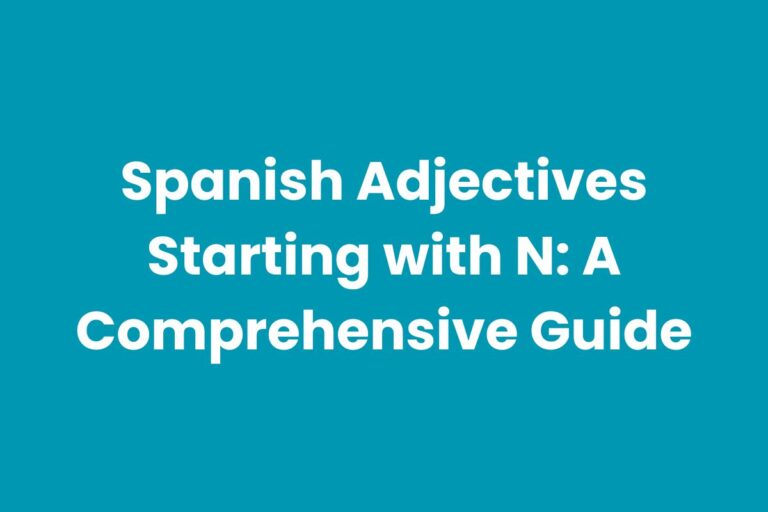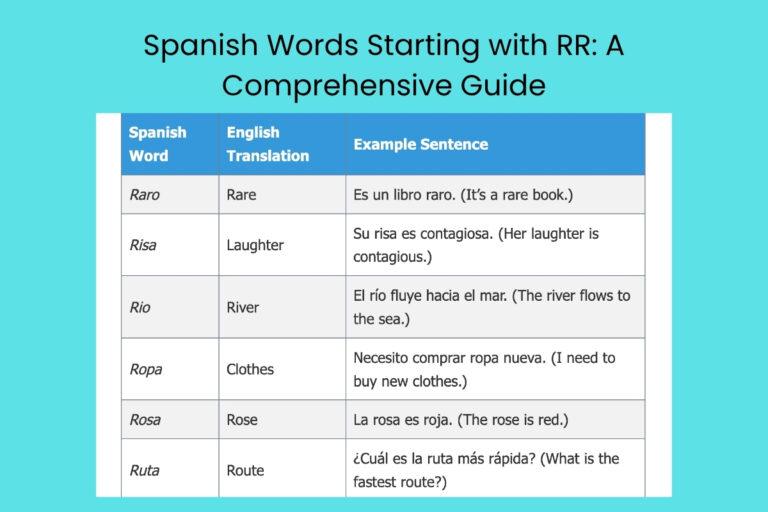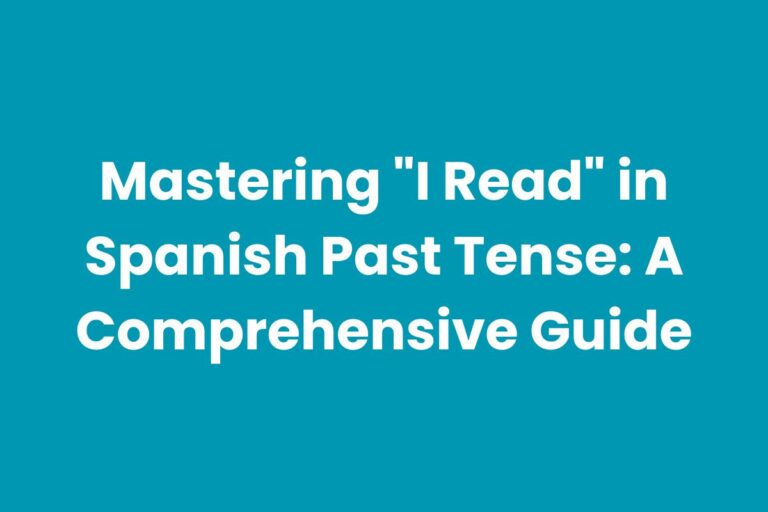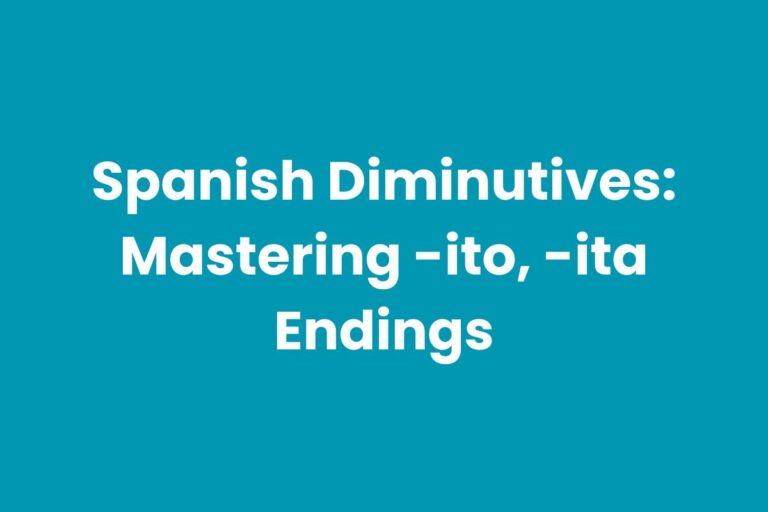Spanish Conditional Perfect: Usage, Structure, and Examples
The Spanish Conditional Perfect tense, also known as the Condicional Compuesto, is a vital tool for expressing hypothetical past actions and unrealized possibilities. Mastering this tense allows speakers to convey regret, speculation about past events, or polite requests in a more nuanced and sophisticated manner. This article provides a comprehensive guide to the Spanish Conditional Perfect, covering its definition, formation, usage, common mistakes, and practice exercises. Whether you’re an intermediate learner looking to refine your grammar or an advanced student aiming for fluency, this guide will equip you with the knowledge and skills to confidently use the Conditional Perfect tense.
By understanding the structure and context of the Spanish Conditional Perfect, learners can engage in more complex and meaningful conversations, expressing thoughts and ideas with greater precision. From discussing what could have been to making polite suggestions, this tense opens up a range of communicative possibilities.
This article aims to demystify the Conditional Perfect, offering clear explanations and practical examples to help you integrate it seamlessly into your Spanish.
Table of Contents
- Definition of the Spanish Conditional Perfect Tense
- Structural Breakdown
- Usage Rules
- Examples of the Conditional Perfect Tense
- Common Mistakes
- Practice Exercises
- Advanced Topics
- Frequently Asked Questions (FAQ)
- Conclusion
Definition of the Spanish Conditional Perfect Tense
The Spanish Conditional Perfect (Condicional Compuesto) is a compound tense used to express what would have happened under certain conditions that were not met. It is used to talk about hypothetical situations in the past, expressing regret, speculation, or possibility regarding actions that did not occur. It combines the conditional form of the auxiliary verb haber (to have) with the past participle of the main verb.
The primary function of the Conditional Perfect is to express hypothetical actions or events that are contrary to fact. In other words, it describes what *could have*, *would have*, or *should have* happened if circumstances had been different.
This tense is crucial for expressing nuanced meanings related to unrealized possibilities and past regrets.
The Conditional Perfect is often found in conditional sentences, particularly in the “if-then” clauses that describe unreal past conditions and their hypothetical results. It is also used independently to express polite requests or suggestions related to past actions.
Understanding the Conditional Perfect is essential for mastering complex Spanish grammar and expressing a wide range of ideas.
Structural Breakdown
The Spanish Conditional Perfect is formed using two components:
- The conditional form of the auxiliary verb haber (to have).
- The past participle of the main verb.
The conditional form of haber is conjugated as follows:
- Yo habría (I would have)
- Tú habrías (You would have)
- Él/Ella/Usted habría (He/She/You would have)
- Nosotros/Nosotras habríamos (We would have)
- Vosotros/Vosotras habríais (You all would have)
- Ellos/Ellas/Ustedes habrían (They/You all would have)
The past participle is formed by adding -ado to the stem of -ar verbs and -ido to the stem of -er and -ir verbs. For example:
- Hablar (to speak) -> Hablado (spoken)
- Comer (to eat) -> Comido (eaten)
- Vivir (to live) -> Vivido (lived)
Therefore, the complete structure of the Conditional Perfect is:
Haber (conditional) + Past Participle
Here are some examples of the Conditional Perfect conjugation for different verbs:
| Pronoun | Hablar (to speak) | Comer (to eat) | Vivir (to live) |
|---|---|---|---|
| Yo | Habría hablado | Habría comido | Habría vivido |
| Tú | Habrías hablado | Habrías comido | Habrías vivido |
| Él/Ella/Usted | Habría hablado | Habría comido | Habría vivido |
| Nosotros/Nosotras | Habríamos hablado | Habríamos comido | Habríamos vivido |
| Vosotros/Vosotras | Habríais hablado | Habríais comido | Habríais vivido |
| Ellos/Ellas/Ustedes | Habrían hablado | Habrían comido | Habrían vivido |
The table above illustrates how the Conditional Perfect is formed by combining the conditional form of haber with the past participle of the main verb. This structure remains consistent for all regular verbs, making it easier to learn and apply.
Usage Rules
The Conditional Perfect has several key uses in Spanish. Understanding these contexts is crucial for using the tense correctly and effectively.
Hypothetical Past Actions
The Conditional Perfect is commonly used to express what would have happened if something else had occurred in the past. It describes unrealized possibilities and often conveys a sense of regret or missed opportunity. These are situations that are contrary to fact – they didn’t happen.
Example: Si hubiera estudiado más, habría aprobado el examen. (If I had studied more, I would have passed the exam.)
In this example, the speaker didn’t study enough, and therefore didn’t pass the exam. The Conditional Perfect expresses the hypothetical outcome of a different action.
Speculation About the Past
This tense can also be used to speculate about past events, expressing what might have happened or what someone could have done. It is used when the speaker is making an educated guess about a past situation based on available information.
Example: ¿Por qué no vino ayer? Habría estado enfermo. (Why didn’t he come yesterday? He must have been sick.)
Here, the speaker is speculating that the person was sick, providing a possible explanation for their absence.
Polite Requests or Suggestions (Retrospective)
The Conditional Perfect can be used to make polite requests or suggestions related to past actions, often expressing a sense of mild reproach or regret. It softens the tone, making the request seem less demanding.
Example: Habrías podido llamarme. (You could have called me.)
This sentence implies that the person didn’t call, and the speaker is gently suggesting that it would have been a good idea to do so.
Reporting Future in the Past
The Conditional Perfect can be used in reported speech to express what someone said would happen in the future, from a past perspective. It is used when reporting a future action from a past point in time.
Example: Dijo que habría terminado el trabajo para el viernes. (He said that he would have finished the work by Friday.)
In this example, the speaker is reporting what someone said about finishing the work by Friday, viewed from a past point in time.
Examples of the Conditional Perfect Tense
Here are several examples of the Conditional Perfect tense in different contexts, showcasing its versatility and usage. Each example is categorized to illustrate the specific application of the tense.
Hypothetical Past Actions Examples
This table provides examples of the Conditional Perfect used to express hypothetical past actions, showing what would have happened under different circumstances.
| Sentence | Translation |
|---|---|
| Si hubiera tenido dinero, habría comprado un coche nuevo. | If I had had money, I would have bought a new car. |
| Si hubiéramos llegado a tiempo, habríamos visto la película. | If we had arrived on time, we would have seen the movie. |
| Si ella hubiera estudiado francés, habría entendido la conversación. | If she had studied French, she would have understood the conversation. |
| Si hubieras escuchado mis consejos, no habrías tenido problemas. | If you had listened to my advice, you wouldn’t have had problems. |
| Si hubiera sabido la verdad, habría actuado de manera diferente. | If I had known the truth, I would have acted differently. |
| Si hubiéramos reservado con anticipación, habríamos conseguido mejores asientos. | If we had booked in advance, we would have gotten better seats. |
| Si ella hubiera aceptado el trabajo, habría ganado mucho dinero. | If she had accepted the job, she would have earned a lot of money. |
| Si hubieras cerrado la puerta, no habrían entrado los mosquitos. | If you had closed the door, the mosquitoes wouldn’t have come in. |
| Si hubiera llovido, habríamos cancelado el picnic. | If it had rained, we would have canceled the picnic. |
| Si hubiéramos tenido más tiempo, habríamos visitado el museo. | If we had had more time, we would have visited the museum. |
| Si ella hubiera sido más valiente, habría dicho la verdad. | If she had been braver, she would have told the truth. |
| Si hubieras sido más paciente, habrías logrado tus metas. | If you had been more patient, you would have achieved your goals. |
| Si hubiera leído el libro, habría entendido la película. | If I had read the book, I would have understood the movie. |
| Si hubiéramos comprado las entradas antes, habríamos ahorrado dinero. | If we had bought the tickets earlier, we would have saved money. |
| Si ella hubiera estudiado medicina, habría sido doctora. | If she had studied medicine, she would have been a doctor. |
| Si hubieras seguido las instrucciones, habrías evitado el error. | If you had followed the instructions, you would have avoided the mistake. |
| Si hubiera tomado el tren, habría llegado a tiempo. | If I had taken the train, I would have arrived on time. |
| Si hubiéramos salido antes, no habríamos perdido el vuelo. | If we had left earlier, we wouldn’t have missed the flight. |
| Si ella hubiera aprendido a nadar, habría disfrutado más de las vacaciones. | If she had learned to swim, she would have enjoyed the vacation more. |
| Si hubieras invertido en esa empresa, habrías ganado mucho dinero. | If you had invested in that company, you would have made a lot of money. |
| Si hubiera aceptado su invitación, habría conocido a gente interesante. | If I had accepted his invitation, I would have met interesting people. |
| Si hubiéramos tenido un coche, habríamos viajado por todo el país. | If we had had a car, we would have traveled all over the country. |
| Si ella hubiera hablado con él, habría resuelto el problema. | If she had talked to him, she would have solved the problem. |
| Si hubieras ido al gimnasio, habrías estado en mejor forma. | If you had gone to the gym, you would have been in better shape. |
| Si hubiera comprado la casa, habría sido feliz allí. | If I had bought the house, I would have been happy there. |
| Si hubiéramos sabido que venías, habríamos preparado una fiesta. | If we had known you were coming, we would have prepared a party. |
This table showcases a variety of hypothetical scenarios, demonstrating how the Conditional Perfect is used to express unrealized possibilities and their potential outcomes. Each sentence highlights the “if-then” structure common in these types of statements.
Speculation About the Past Examples
The following table provides examples of the Conditional Perfect used to speculate about past events, expressing what might have happened or what someone could have done.
| Sentence | Translation |
|---|---|
| No contestó el teléfono. Habría estado durmiendo. | He didn’t answer the phone. He must have been sleeping. |
| No lo vi en la fiesta. Habría estado ocupado. | I didn’t see him at the party. He must have been busy. |
| Perdió el tren. Habría salido tarde de casa. | He missed the train. He must have left home late. |
| No aprobó el examen. No habría estudiado lo suficiente. | He didn’t pass the exam. He probably didn’t study enough. |
| Llegaron tarde. Habría habido mucho tráfico. | They arrived late. There must have been a lot of traffic. |
| No vino a la reunión. Habría tenido un compromiso. | He didn’t come to the meeting. He must have had an appointment. |
| No me llamó. Habría estado enfadado conmigo. | He didn’t call me. He must have been angry with me. |
| No encontraron el camino. Habrían usado un mapa equivocado. | They didn’t find the way. They must have used the wrong map. |
| No compró el coche. Habría sido demasiado caro. | He didn’t buy the car. It must have been too expensive. |
| No aceptó el trabajo. Habría tenido mejores ofertas. | He didn’t accept the job. He must have had better offers. |
| No vino a la cena. Habría estado cansado. | He didn’t come to dinner. He must have been tired. |
| No me reconoció. Habría cambiado mucho. | He didn’t recognize me. I must have changed a lot. |
| No entendió la explicación. Habría sido demasiado complicada. | He didn’t understand the explanation. It must have been too complicated. |
| No encontraron las llaves. Las habrían perdido. | They didn’t find the keys. They must have lost them. |
| No ganó el partido. Habría jugado mal. | He didn’t win the game. He must have played badly. |
| No leyó el mensaje. Habría estado sin batería. | He didn’t read the message. His phone must have been out of battery. |
| No terminó el proyecto. Habría tenido problemas técnicos. | He didn’t finish the project. He must have had technical problems. |
| No respondió a la carta. La habría recibido tarde. | He didn’t answer the letter. He must have received it late. |
| No encontró el libro. Lo habrían movido de sitio. | He didn’t find the book. Someone must have moved it. |
| No aprendió el idioma. No habría tenido tiempo. | He didn’t learn the language. He must not have had time. |
| No pudo venir. Habría tenido un imprevisto. | He couldn’t come. Something unexpected must have happened. |
| No lo vio en la calle. No habría estado prestando atención. | He didn’t see him on the street. He must not have been paying attention. |
| No entendí la pregunta. Habría sido mal formulada. | I didn’t understand the question. It must have been poorly worded. |
| No me devolvió el dinero. Lo habría olvidado. | He didn’t return the money. He must have forgotten. |
| No encontró trabajo. No habría buscado bien. | He didn’t find a job. He must not have looked well. |
This table provides various scenarios where the speaker is speculating about the reasons behind certain past events. The Conditional Perfect is used to offer possible explanations based on the available information.
Polite Requests Examples
This table illustrates how the Conditional Perfect can be used to make polite requests or suggestions related to past actions, often expressing a sense of mild reproach or regret.
| Sentence | Translation |
|---|---|
| Habrías podido llamarme antes. | You could have called me earlier. |
| Habrías podido ayudarme con la tarea. | You could have helped me with the homework. |
| Habrías podido avisarme de la situación. | You could have warned me about the situation. |
| Habrías podido ser más considerado. | You could have been more considerate. |
| Habrías podido escucharme. | You could have listened to me. |
| Habrías podido ser más paciente. | You could have been more patient. |
| Habrías podido llegar a tiempo. | You could have arrived on time. |
| Habrías podido ser más honesto. | You could have been more honest. |
| Habrías podido ser más responsable. | You could have been more responsible. |
| Habrías podido ser más amable. | You could have been more kind. |
| Habrías podido ser más atento. | You could have been more attentive. |
| Habrías podido ser más comprensivo. | You could have been more understanding. |
| Habrías podido ser más discreto. | You could have been more discreet. |
| Habrías podido ser más precavido. | You could have been more cautious. |
| Habrías podido ser más generoso. | You could have been more generous. |
| Habrías podido ser más tolerante. | You could have been more tolerant. |
| Habrías podido ser más valiente. | You could have been more brave. |
| Habrías podido ser más respetuoso. | You could have been more respectful. |
| Habrías podido ser más humilde. | You could have been more humble. |
These examples demonstrate the polite, yet slightly reproachful, tone that the Conditional Perfect can convey when used to suggest alternative past actions.
Reporting Future in the Past Examples
The table below gives examples of Conditional Perfect used in reported speech to express what someone said would happen in the future, from a past perspective.
| Sentence | Translation |
|---|---|
| Dijo que habría terminado el proyecto para el lunes. | He said that he would have finished the project by Monday. |
| Me prometió que habría llegado a tiempo. | He promised me that he would have arrived on time. |
| Nos aseguró que habría reservado el hotel. | He assured us that he would have booked the hotel. |
| Les informó que habría enviado el correo electrónico. | He informed them that he would have sent the email. |
| Me contó que habría comprado los billetes. | He told me that he would have bought the tickets. |
| Nos explicó que habría preparado la cena. | He explained to us that he would have prepared dinner. |
| Les confirmó que habría asistido a la reunión. | He confirmed to them that he would have attended the meeting. |
| Me indicó que habría llamado al cliente. | He indicated to me that he would have called the client. |
| Nos comunicó que habría resuelto el problema. | He communicated to us that he would have solved the problem. |
| Les notificó que habría pagado la factura. | He notified them that he would have paid the bill. |
| Me especificó que habría revisado el informe. | He specified to me that he would have reviewed the report. |
| Nos detalló que habría organizado el evento. | He detailed to us that he would have organized the event. |
| Les aclaró que habría completado la tarea. | He clarified to them that he would have completed the task. |
| Me reveló que habría guardado el secreto. | He revealed to me that he would have kept the secret. |
| Nos demostró que habría aprendido la lección. | He demonstrated to us that he would have learned the lesson. |
| Les probó que habría mejorado su actitud. | He proved to them that he would have improved his attitude. |
| Me certificó que habría cumplido su promesa. | He certified to me that he would have fulfilled his promise. |
These examples show how to report future actions from a past perspective using the Conditional Perfect, providing a clear understanding of how to use this tense in reported speech.
Common Mistakes
One common mistake is confusing the Conditional Perfect with the Future Perfect. The Conditional Perfect expresses hypothetical past actions, while the Future Perfect expresses actions that will be completed at some point in the future.
For example:
- Incorrect: Si hubiera estudiado, habré aprobado el examen. (If I had studied, I will have passed the exam.)
- Correct: Si hubiera estudiado, habría aprobado el examen. (If I had studied, I would have passed the exam.)
Another mistake is using the wrong form of the verb haber. It’s crucial to use the conditional form (habría, habrías, habría, habríamos, habríais, habrían) and not another tense. For example:
- Incorrect: Si yo he estudiado, habría aprobado el examen. (If I have studied, I would have passed the exam.)
- Correct: Si yo hubiera estudiado, habría aprobado el examen. (If I had studied, I would have passed the exam.)
A further common error is incorrect past participle formation. Remember the rules for regular and irregular past participles to avoid mistakes.
For example:
- Incorrect: Habría escribido una carta. (I would have writed a letter.)
- Correct: Habría escrito una carta. (I would have written a letter.)
In the incorrect example, ‘escribido’ is the incorrect past participle of ‘escribir’. The correct form is ‘escrito’.
Paying attention to these common errors can significantly improve the accuracy of your Spanish.
Practice Exercises
These practice exercises will help you reinforce your understanding of the Spanish Conditional Perfect tense. Each exercise focuses on a different aspect of the tense, from conjugation to sentence construction.
Exercise 1: Conjugation Practice
Complete the following sentences by conjugating the verb in parentheses into the Conditional Perfect tense.
| Sentence | Answer |
|---|---|
| Yo __________ (comer) la pizza si hubiera tenido hambre. | Yo habría comido la pizza si hubiera tenido hambre. |
| Tú __________ (viajar) a España si hubieras tenido dinero. | Tú habrías viajado a España si hubieras tenido dinero. |
| Él __________ (estudiar) más si hubiera sabido que era importante. | Él habría estudiado más si hubiera sabido que era importante. |
| Nosotros __________ (ir) al cine si hubiéramos tenido tiempo. | Nosotros habríamos ido al cine si hubiéramos tenido tiempo. |
| Vosotros __________ (bailar) en la fiesta si os hubiera gustado la música. | Vosotros habríais bailado en la fiesta si os hubiera gustado la música. |
| Ellos __________ (llegar) a tiempo si hubieran salido antes. | Ellos habrían llegado a tiempo si hubieran salido antes. |
| Ella __________ (escribir) un libro si hubiera tenido inspiración. | Ella habría escrito un libro si hubiera tenido inspiración. |
| Usted __________ (ayudar) si le hubiéramos pedido. | Usted habría ayudado si le hubiéramos pedido. |
| Yo __________ (comprar) un coche nuevo si hubiera tenido el dinero. | Yo habría comprado un coche nuevo si hubiera tenido el dinero. |
| Nosotros __________ (aprender) español si hubiéramos vivido en España. | Nosotros habríamos aprendido español si hubiéramos vivido en España. |
This exercise focuses on the correct conjugation of verbs in the Conditional Perfect tense, helping learners to internalize the structure of the tense.
Exercise 2: Sentence Completion
Complete the following sentences using the Conditional Perfect tense to express a hypothetical past action.
| Sentence | Answer |
|---|---|
| Si hubiera sabido que vendrías, yo __________ (preparar) una cena especial. | Si hubiera sabido que vendrías, yo habría preparado una cena especial. |
| Si hubiéramos tenido un mapa, nosotros __________ (encontrar) el camino. | Si hubiéramos tenido un mapa, nosotros habríamos encontrado el camino. |
| Si ella hubiera estudiado más, ella __________ (aprobar) el examen. | Si ella hubiera estudiado más, ella habría aprobado el examen. |
| Si hubieras seguido mis consejos, tú __________ (evitar) muchos problemas. | Si hubieras seguido mis consejos, tú habrías evitado muchos problemas. |
| Si hubiéramos tenido más tiempo, nosotros __________ (visitar) el museo. | Si hubiéramos tenido más tiempo, nosotros habríamos visitado el museo. |
| Si él hubiera sido más valiente, él __________ (decir) la verdad. | Si él hubiera sido más valiente, él habría dicho la verdad. |
| Si hubieras sido más paciente, tú __________ (lograr) tus metas. | Si hubieras sido más paciente, tú habrías logrado tus metas. |
| Si hubiera leído el libro, yo __________ (entender) la película. | Si hubiera leído el libro, yo habría entendido la película. |
| Si hubiéramos comprado las entradas antes, nosotros __________ (ahorrar) dinero. | Si hubiéramos comprado las entradas antes, nosotros habríamos ahorrado dinero. |
| Si ella hubiera aceptado el trabajo, ella __________ (ganar) mucho dinero. | Si ella hubiera aceptado el trabajo, ella habría ganado mucho dinero. |
This exercise reinforces the use of the Conditional Perfect in conditional sentences, helping learners to understand the relationship between the hypothetical condition and the unrealized outcome.
Exercise 3: Translation
Translate the following sentences into Spanish using the Conditional Perfect tense.
| English Sentence | Spanish Translation |
|---|---|
| If I had known, I would have helped you. | Si hubiera sabido, te habría ayudado. |
| If we had gone to the party, we would have had fun. | Si hubiéramos ido a la fiesta, nos habríamos divertido. |
| He would have arrived earlier if he had taken a taxi. | Habría llegado antes si hubiera tomado un taxi. |
| She would have called you if she had had your number. | Ella te habría llamado si hubiera tenido tu número. |
| They would have visited us if they had had time. | Nos habrían visitado si hubieran tenido tiempo. |
| I would have bought that car if I had had enough money. | Habría comprado ese coche si hubiera tenido suficiente dinero. |
| We would have eaten at that restaurant if it had been open. | Habríamos comido en ese restaurante si hubiera estado abierto. |
| You would have understood the | Habrías entendido la explicación si hubieras prestado atención. |
| If they had studied more, they would have passed the exam. | Si hubieran estudiado más, habrían aprobado el examen. |
| She would have traveled the world if she had had the opportunity. | Ella habría viajado por el mundo si hubiera tenido la oportunidad. |
This exercise tests the learner’s ability to translate English sentences into Spanish using the Conditional Perfect tense, reinforcing both grammatical understanding and vocabulary.
Advanced Topics
For advanced learners, understanding the nuances of the Conditional Perfect in more complex contexts can further enhance their proficiency. This section explores conditional sentences (type 3) and literary usage.
Conditional Sentences (Type 3)
Type 3 conditional sentences, also known as past unreal conditionals, describe situations that are contrary to fact in the past. These sentences consist of two clauses:
- The “if” clause (si clause): This clause uses the past perfect subjunctive (pluscuamperfecto de subjuntivo) to describe the unreal condition.
- The main clause: This clause uses the Conditional Perfect to describe the hypothetical result.
The structure is as follows:
Si + past perfect subjunctive, Conditional Perfect.
Example: Si hubiera estudiado, habría aprobado el examen. (If I had studied, I would have passed the exam.)
In this example, the past perfect subjunctive is hubiera estudiado, and the Conditional Perfect is habría aprobado. This structure is essential for expressing complex hypothetical scenarios in the past.
Literary Usage
In literature, the Conditional Perfect is often used to add depth and emotion to narratives. Authors use this tense to explore characters’ regrets, missed opportunities, and the consequences of past decisions.
Example: “Si hubiera sabido lo que iba a pasar, habría tomado otro camino.” (If I had known what was going to happen, I would have taken another path.)
This sentence, commonly found in novels or short stories, expresses a character’s regret and highlights the impact of past events on their present situation. The Conditional Perfect adds a layer of introspection and emotional resonance to the narrative.
Frequently Asked Questions (FAQ)
How does the Conditional Perfect differ from the Future Perfect?
The Conditional Perfect expresses hypothetical past actions, while the Future Perfect expresses actions that will be completed at some point in the future. The Conditional Perfect is used for unrealized possibilities, while the Future Perfect is used for projected future completion.
Can the Conditional Perfect be used in questions?
Yes, the Conditional Perfect can be used in questions, often to express polite inquiries or speculation about past actions. For example: ¿Habrías preferido ir al cine? (Would you have preferred to go to the cinema?)
Are there any irregular past participles I should be aware of?
Yes, there are several irregular past participles in Spanish. Some common examples include:
- Abrir (to open) -> Abierto (opened)
- Decir (to say) -> Dicho (said)
- Escribir (to write) -> Escrito (written)
- Hacer (to do/make) -> Hecho (done/made)
- Morir (to die) -> Muerto (dead)
- Poner (to put) -> Puesto (put)
- Ver (to see) -> Visto (seen)
- Volver (to return) -> Vuelto (returned)
Is the Conditional Perfect used in formal or informal contexts?
The Conditional Perfect is appropriate for both formal and informal contexts. Its usage depends more on the specific meaning you want to convey rather than the formality of the situation.
How can I improve my ability to use the Conditional Perfect correctly?
Practice is key. Try to incorporate the Conditional Perfect into your daily conversations or writing exercises.
Pay attention to the context in which you encounter the tense, and don’t be afraid to make mistakes and learn from them.
Conclusion
The Spanish Conditional Perfect tense is a powerful tool for expressing hypothetical past actions, speculation, polite requests, and reported speech. By understanding its structure, usage rules, and common pitfalls, learners can significantly enhance their ability to communicate complex ideas in Spanish.
Through consistent practice and attention to detail, mastering the Conditional Perfect will undoubtedly enrich your Spanish language skills and allow for more nuanced and sophisticated expression.
